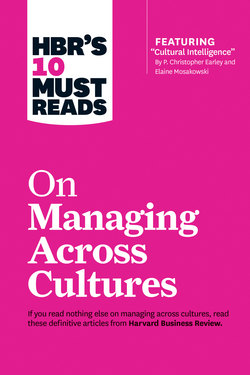Читать книгу HBR's 10 Must Reads on Managing Across Cultures (with featured article "Cultural Intelligence" by P. Christopher Earley and Elaine Mosakowski) - Harvard Business Review - Страница 8
На сайте Литреса книга снята с продажи.
Head
ОглавлениеRote learning about the beliefs, customs, and taboos of foreign cultures, the approach corporate training programs tend to favor, will never prepare a person for every situation that arises, nor will it prevent terrible gaffes. However, inquiring about the meaning of some custom will often prove unavailing because natives may be reticent about explaining themselves to strangers, or they may have little practice looking at their own culture analytically.
Instead, a newcomer needs to devise what we call learning strategies. Although most people find it difficult to discover a point of entry into alien cultures, whose very coherence can make them seem like separate, parallel worlds, an individual with high cognitive CQ notices clues to a culture’s shared understandings. These can appear in any form and any context but somehow indicate a line of interpretation worth pursuing.
An Irish manager at an international advertising firm was working with a new client, a German construction and engineering company. Devin’s experience with executives in the German retail clothing industry was that they were reasonably flexible about deadlines and receptive to highly imaginative proposals for an advertising campaign. He had also worked with executives of a British construction and engineering company, whom he found to be strict about deadlines and intent on a media campaign that stressed the firm’s technical expertise and the cost savings it offered.
Devin was unsure how to proceed. Should he assume that the German construction company would take after the German clothing retailer or, instead, the British construction company? He resolved to observe the new client’s representative closely and draw general conclusions about the firm and its culture from his behavior, just as he had done in the other two cases. Unfortunately, the client sent a new representative to every meeting. Many came from different business units and had grown up in different countries. Instead of equating the first representative’s behavior with the client’s corporate culture, Devin looked for consistencies in the various individuals’ traits. Eventually he determined that they were all punctual, deadline-oriented, and tolerant of unconventional advertising messages. From that, he was able to infer much about the character of their employer.
